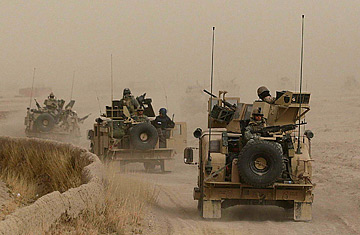
U.S. Special Forces soldiers and International Security Assistance soldiers patrol in a humvee in Spawan Ghar, Panjwayi province, Afghanistan, Thursday, Jan. 18, 2007.
"If we had built the capacity of the Afghan national army and police, we would not be in the position we're in right now, facing a serious challenge in the spring from the Taliban," Afghan Ambassador Said Jawad told TIME on Thursday. "There was an underinvestment in building the capacity of the Afghan security forces, as well as [of] the Afghan government to deliver services. And now we are paying a price for that."
In the wake of the Taliban ground offensive in southern Afghanistan last summer and fall, Afghan officials pledged to have 70,000 soldiers and 82,000 police officers deployed by October 2008, years ahead of schedule. But the Afghans have been pleading for help to fund the recruitment, training and equipping of those forces — and aid has been surprisingly slow in coming. Only recently, according to Jawad, has the Afghanistan government been able to raise the pay of Afghan soldiers from $70 to $100 a month. If the new U.S. aid package goes through, Jawad told TIME, the government will also be able to offer policemen $100 a month.
Even then, the wages paid by the security forces are minuscule compared to what a fighter can earn working for a heroin-trafficking warlord. Still, says Jawad, government recruiters are able to play on patriotism and moral duty. "We should not look at strictly on a dollar basis," he says. "This is building Afghanistan, and the other path is destroying Afghanistan. So people are willing to take some sacrifices providing they're able to feed their children."
The new military aid package announced Friday is designed to help equip government forces with helicopters, heavier weapons and armor, and communications gear that would give them the capacity to operate independently against Taliban guerrillas in harsh terrain. But that won't happen in time to face the Taliban's anticipated spring offensive. So, the Pentagon also announced Wednesday that 3,200 soldiers from the U.S. 10th Mountain Division will have their tour of duty in Afghanistan extended by four months. Defense Secretary Robert Gates has said he is likely to ask President Bush for several thousand more American troops augment the 24,000 already there, and Washington is pressing NATO allies to provide more troops of their own — and in some cases, to ease restrictions on those forces being deployed in the combat zone in the south.
Boosting troop levels in Afghanistan is unlikely to meet the sort of congressional opposition facing President Bush's proposed Iraq troop surge. Democratic Senators Hillary Clinton and Evan Bayh, in fact, earlier this month urged Secretary Gates to send more soldiers to prevent failure in Afghanistan.
A major challenge facing efforts to ward off the Taliban challenge is ensuring greater cooperation from Pakistan, where U.S. and NATO officials have said Taliban leaders are based. Although, under pressure from the U.S., the governments of Pakistan and Afghanistan have agreed to cooperate to secure the border, Ambassador Jawad acknowledges that such cooperation has not been fully implemented yet."
The $2.6 billion in reconstruction aid sought by the Bush Administration will go largely to building an electrical power distribution system — only 6% of Afghans now have dependable electrical power, according to Jawad — and to constructing roads. Farmers unable to move crops to market in the cities are turning to opium growing because the harvest, reduced to opium paste, then processed to morphine base or finished heroin, is relatively imperishable and highly concentrated — and the trafficking groups handle all the transportation headaches. But Afghan and U.S. officials acknowledge that Afghanistan's viability as a state depends on whether the security and infrastructure can be put in place to nurture a legitimate economy in the hinterlands.
